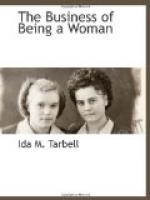That marriage gives the finest opportunity that life affords for practicing, not rules, but principles, she has never been taught. Flexibility, adaptation, fair-mindedness, the habit of supplementing the weakness of the one by the strength of the other, all the fine things upon which the beauty, durability, and growth of human relations depend,—these are what decide the future of her marriage. These she misses while she insists on her rules; and ruin is often the end. Study the causes back of divorces and separations, the brutal criminal causes aside, and one finds that usually they begin in trivial things,—an irritating habit or an offensive opinion persisted in on the one side and not endured philosophically on the other; a petty selfishness indulged on the one side and not accepted humorously on the other,—that is, the marriage is made or unmade by small, not great, things.
It is a lack of any serious consideration of the nature of the undertaking she is going into which permits her at the start to accept a false notion of her economic position. She agrees that she is being “supported”; she consents to accept what is given her; she even consents to ask for money. Men and society at large take her at her own valuation. Loose thinking by those who seek to influence public opinion has aggravated the trouble. They start with the idea that she is a parasite—does not pay her way. “Men hunt, fish, keep the cattle, or raise corn,” says a popular writer, “for women to eat the game, the fish, the meat, and the corn.” The inference is that the men alone render useful service. But neither man nor woman eats of these things until the woman has prepared them. The theory that the man who raises corn does a more important piece of work than the woman who makes it into bread is absurd. The theory that she does something more difficult and less interesting is equally absurd.
The practice of handing over the pay envelope at the end of the week to the woman, so common among laboring people, is a recognition of her equal economic function. It is a recognition that the venture of the two is common and that its success depends as much on the care and intelligence with which she spends the money as it does on the energy and steadiness with which he earns it. Whenever one or the other fails, trouble begins. The failure to understand this business side of the marriage relation almost inevitably produces humiliation and irritation. So serious has the strain become because of this false start that various devices have been suggested to repair it—Mr. Wells’ “Paid Motherhood” is one; weekly wages as for a servant is another. Both notions encourage the primary mistake that the woman has not an equal economic place with the man in the marriage.




